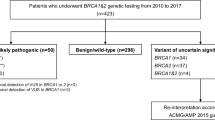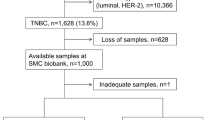Abstract
Background
Unique pathogenic mutations in BRCA1 and 2 genes have been reported in different populations of patients originating from the Middle East region. Limited data are available for the Iraqi population. For many reasons a large number of Iraqi patients present to Lebanon for medical care. This is the first report of BRCA full gene sequencing conducted in a cohort of high-risk patients originating from Iraq.
Methods
This is a retrospective review of Iraqi patients diagnosed with breast or ovarian cancer referred for BRCA mutation testing at the American University of Beirut from January 2012 to October 2018.
Results
Of the 42 Iraqi women who underwent genetic testing at our institution, 3 BRCA pathogenic variants were found. Two mutations in BRCA1 c.224_227delAAAG and c.5431C > T and one mutation in BRCA2 c.5576_5579delTTAA were identified. Three other patients had sequence changes considered as variants of undetermined significance.
Conclusion
In this cohort of high-risk patients, one out of the three pathogenic BRCA variants detected has not previously been reported in the Middle Eastern population. Further studies are required to delineate the spectrum of BRCA mutations in the Iraqi population.
Similar content being viewed by others
Background
The American University of Beirut Medical Center (AUBMC) is a major tertiary referral center in the Middle East. For several reasons including conflict-related deficiencies in healthcare services, a significant number of Iraqi patients seek cancer care at AUBMC [1]. Breast cancer is reportedly the most common primary tumor diagnosed in Iraqi females, with around 3000 cases registered in 2009 [2]. We have recently reviewed the literature regarding BRCA mutations reported in the Middle East and North Africa (MENA) region [3], we found a certain number of mutations specific to each country. Very limited information is however available regarding BRCA mutations in the Iraqi population.
The aim of our study is to review the data from patients of Iraqi origin referred to our institution for BRCA genetic testing. As far as we are aware, this is the first report of whole BRCA1 and BRCA 2 genes sequencing performed in this population.
Methods
After Institutional Review Board (IRB) approval, we retrospectively reviewed all cases of Iraqi patients who presented for BRCA mutation testing at the Medical Genetics Unit at AUBMC between January 2012 and October 2018. All data were collected from medical charts available at our institution.
QiaAmp DNA Mini kit was used to extract DNA from blood samples. BRCA1 and 2 genes were amplified using exon-specific primers designed via Primer 3. PCR efficiency was confirmed by amplification on agarose gel 2%. The amplicons were then enzymatically purified using Exonuclease I and Shrimp Alkaline Phosphatase, sequenced and loaded on the Genetic Analyzer (Applied Biosystem ABI 3500). Obtained sequences were analyzed using Seqscape® v2.7 software and compared to the corresponding reference sequences ([4, 5]). ClinVar was used to determine the significance of the variations found [6].
Results
A total of 42 unrelated Iraqi women were referred for genetic testing performed at AUBMC. The mean age was 47.2 (27–69) years with 10.4 standard deviation. All of the 42 women had a diagnosis of breast cancer, 14 had a positive first-degree family history of breast or ovarian cancer (Table 1). Patients with a diagnosis of breast cancer without a positive first-degree family history were referred for testing for high-risk features in line with National Comprehensive Cancer Network (NCCN) guidelines [7].
Two disease causing variants (c.224_227delAAAG and c.5431C > T) in BRCA1 and one (c.5576_5579delTTAA) in BRCA2 was observed in the present study (Table 2) (Additional files 1, 2 and 3). Three variants of unknown significance (VUS) in BRCA1 (c.536A > G, c.1458 T > G, c.1648A > C) were observed in two patients whereas one patient had one VUS in BRCA2 (c.1075G > A) (Table 3) (Additional files 4, 5, 6, 7, 8, 9 and 10).
Discussion
Of the 958 Iraqi patients referred to AUBMC in the past 3 years for treatment of cancer, 14.5% presented for diagnosis, treatment or consultation exclusively for breast cancer [1].
Patients from Iraq receiving cancer care in Lebanon are not covered by third-party insurance resulting in considerable financial constraints related to diagnostic tests and treatment. For this reason, and decreased availability of genetic counseling, we suspect significant underutilization of BRCA testing for eligible patients.
We conducted a literature review of previously reported mutations in BRCA1 and 2 genes detected in patients of Iraqi origin. Very few data have been published on BRCA findings in the Iraqi population and of the studies available, none has conducted whole BRCA1 and 2 genes sequencing.
In 1997, a study investigating the presence of 5 specific BRCA mutations in Ashkenazi and non-Ashkenazi Jewish females with breast or ovarian cancer identified the presence of the Ashkenazi Jewish common mutation BRCA1 185delAG, for the first time in an Iraqi patient with no known Ashkenazi ancestry [8] The BRCA1 185delAG has been identified in several other ethnic groups [9]. One other study used PCR amplification with 3 specific primer pairs to investigate the prevalence of 3 specific mutations (BRCA1 185delAG, BRCA1 5382insC and BRCA2 6174delT) in a cohort of Patients in the Hilla region of Iraq however these results have not been validated [10].
In the present study 3 BRCA pathogenic variants were detected by whole gene sequencing performed for clinical reasons. The BRCA2 c.5576_5579delTTAA, which was previously identified in one patient of Lebanese origin [11], is also reportedly a founder mutation in the Chinese population [12]. The BRCA1 c.224_227delAAAG found in our study was previously identified in in 2 out of 53 patients with breast cancer of Kurdish Jewish descent [13].
The third pathogenic variant found in our cohort, BRCA1 c.5431C > T has been documented in 3 unrelated patients with breast cancer of Greek origin [14]. It has not to date been reported in the Middle East region.
Conclusion
In a cohort of high-risk patients for hereditary breast or ovarian cancer of Iraqi origins referred for BRCA testing at our institution, one out of three identified pathogenic variants has not previously been reported in the Middle East region. Because of the heterogeneity of the variants reported to date in the different populations that have been studied in the region, a unified and affordable, panel that would target specific variants cannot be recommended at this stage. Further studies utilizing whole-gene sequencing approaches are required to formulate evidence-based guidelines for BRCA and other cancer related genetic analyses in the region.
Availability of data and materials
The datasets used and analyzed during the current study are available from the corresponding author on reasonable request.
Abbreviations
- AUBMC:
-
American University of Beirut Medical Center
- IRB:
-
Institutional Review Board
- MENA:
-
Middle East and North Africa
References
Mukherji D, Skelton M, Alameddine R, Saifi O, Hammoud MS, Daher M, Charafeddine M, Faraj W, Temraz SN, Shamseddine A, Mula-Hussain LYI, Saleem M, Namiq KF, Dewachi O, Sitta GA. Financial toxicity associated with conflict-induced cross-border travel for cancer care: experience of Iraqi patients in Lebanon. J Clin Oncol. 2018;36(15_suppl):6562. https://doi.org/10.1200/JCO.2018.36.15_suppl.6562.
Iraqi Cancer Registry 2009 (2009). Iraqi Cancer board, Baghdad-Iraq.
Farra C, Dagher C, Badra R, Hammoud MS, Alameddine R, Awwad J, Seoud M, Abbas J, Boulos F, El Saghir N, Mukherji D. BRCA mutation screening and patterns among high-risk Lebanese subjects. Hered Cancer Clin Pract. 2019;17(1):4. https://doi.org/10.1186/s13053-019-0105-9.
Phelan CM, Kwan E, Jack E, Li S, Morgan C, Aube J, Hanna D, Narod SA. A low frequency of non-founder BRCA1 mutations in Ashkenazi Jewish breast-ovarian cancer families. Hum Mutat. 2002;20(5):352–7. https://doi.org/10.1002/humu.10123.
Diop JPD, Diallo RN, Bourdon-Huguenin V, Dem A, Diouf D, Dieng MM, Ba SA, Dia Y, Ka S, Mbengue B, Thiam A, Faye O, Diop PA, Sobol H, Dieye A. Novel BRCA2 pathogenic variant c.5219 T > G; p.(Leu1740Ter) in a consanguineous Senegalese family with hereditary breast cancer. BMC Med Genet. 2019;20(1):73. https://doi.org/10.1186/s12881-019-0814-y.
ClinVar. https://www.ncbi.nlm.nih.gov/clinvar/. Accessed September 2018.
NCCN Guidelines for detection, prevention, & risk reduction. https://www.nccn.org/professionals/physician_gls/default.aspx#detection.
Abeliovich D, Kaduri L, Lerer I, Weinberg N, Amir G, Sagi M, Zlotogora J, Heching N, Peretz T. The founder mutations 185delAG and 5382insC in BRCA1 and 6174delT in BRCA2 appear in 60% of ovarian cancer and 30% of early-onset breast cancer patients among Ashkenazi women. Am J Hum Genet. 1997;60(3):505–14.
Laitman Y, Feng BJ, Zamir IM, Weitzel JN, Duncan P, Port D, Thirthagiri E, Teo SH, Evans G, Latif A, Newman WG, Gershoni-Baruch R, Zidan J, Shimon-Paluch S, Goldgar D, Friedman E. Haplotype analysis of the 185delAG BRCA1 mutation in ethnically diverse populations. Eur J Hum Genet. 2013;21(2):212–6. https://doi.org/10.1038/ejhg.2012.124.
Razzak MS, Muhsin MA, Alshibly IK, Bearem WN. Prevalence of BRCA1/2 gene mutation carriage rate among local Iraqi population. Med J Babylon. 2014;11:2.
El Saghir NS, Zgheib NK, Assi HA, Khoury KE, Bidet Y, Jaber SM, Charara RN, Farhat RA, Kreidieh FY, Decousus S, Romero P, Nemer GM, Salem Z, Shamseddine A, Tfayli A, Abbas J, Jamali F, Seoud M, Armstrong DK, Bignon YJ, Uhrhammer N. BRCA1 and BRCA2 mutations in ethnic Lebanese Arab women with high hereditary risk breast cancer. Oncologist. 2015;20(4):357–64. https://doi.org/10.1634/theoncologist.2014-0364.
Kim YC, Zhao L, Zhang H, Huang Y, Cui J, Xiao F, Downs B, Wang SM. Prevalence and spectrum of BRCA germline variants in mainland Chinese familial breast and ovarian cancer patients. Oncotarget. 2016;7(8):9600–12. https://doi.org/10.18632/oncotarget.7144.
Zick A, Cohen S, Hamburger T, Goldberg Y, Zvi N, Sagi M, Perretz T. A BRCA1 frame shift mutation in women of Kurdish Jewish descent. Open Med J. 2015;2:31–6.
Konstantopoulou I, Tsitlaidou M, Fostira F, Pertesi M, Stavropoulou AV, Triantafyllidou O, Tsotra E, Tsiftsoglou AP, Tsionou C, Droufakou S, Dimitrakakis C, Fountzilas G, Yannoukakos D. High prevalence of BRCA1 founder mutations in Greek breast/ovarian families. Clin Genet. 2014;85(1):36–42. https://doi.org/10.1111/cge.12274.
Acknowledgements
Not applicable.
Funding
No funding was required for this study.
Author information
Authors and Affiliations
Contributions
CF, DM, NES designed the study, CD and LH collected data, CF, CD, LH, NES and DM were responsible for data analysis, interpretation and manuscript writing. All authors read and approved the final manuscript: CF, CD, LH, NES, DM.
Corresponding author
Ethics declarations
Ethics approval and consent to participate
The Institutional Review Board (IRB) of the American University of Beirut Medical Center has approved this research. Due to the retrospective nature of data collection, a waiver of written consent was granted.
Consent for publication
Not applicable.
Competing interests
The authors declare that they have no competing interests.
Additional information
Publisher’s Note
Springer Nature remains neutral with regard to jurisdictional claims in published maps and institutional affiliations.
Additional files
Additional file 1:
BRCA1 c.224_227delAAAG- 16-018 BC (JPG 170 kb)
Additional file 2:
BRCA1 c.5431C > T-16-053 BC (JPG 238 kb)
Additional file 3:
BRCA2 c.5576_5579delTTAA-13-046 BC (JPG 178 kb)
Additional file 4:
BRCA1 VUS c.536A > G- 15-050 BC (JPG 179 kb)
Additional file 5:
BRCA1 VUS c.536A > G- 14-072 BC (JPG 175 kb)
Additional file 6:
BRCA1 VUS c.1458 T > G- 14-072 BC (JPG 244 kb)
Additional file 7:
BRCA1 VUS c.1458 T > G- 15-050 BC (JPG 223 kb)
Additional file 8:
BRCA1 VUS c.1648A > C-14-072 BC (JPG 223 kb)
Additional file 9:
BRCA1 VUS c.1648A > C- 15-050 BC (JPG 220 kb)
Additional file 10:
BRCA2 VUS c.1075G > A- 17-059 BC (JPG 244 kb)
Rights and permissions
Open Access This article is distributed under the terms of the Creative Commons Attribution 4.0 International License (http://creativecommons.org/licenses/by/4.0/), which permits unrestricted use, distribution, and reproduction in any medium, provided you give appropriate credit to the original author(s) and the source, provide a link to the Creative Commons license, and indicate if changes were made. The Creative Commons Public Domain Dedication waiver (http://creativecommons.org/publicdomain/zero/1.0/) applies to the data made available in this article, unless otherwise stated.
About this article
Cite this article
Farra, C., Dagher, C., Hamadeh, L. et al. BRCA mutations in a cohort of Iraqi patients presenting to a tertiary referral center. BMC Med Genet 20, 154 (2019). https://doi.org/10.1186/s12881-019-0885-9
Received:
Accepted:
Published:
DOI: https://doi.org/10.1186/s12881-019-0885-9




